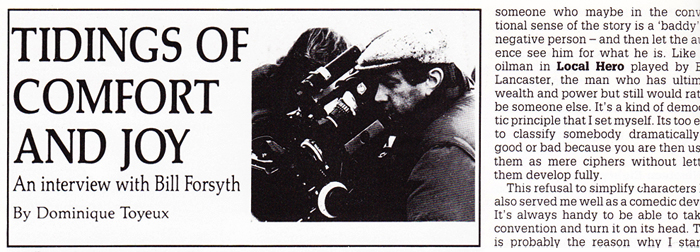
This article was published by numerous European film magazines in 1984. I travelled on an overnight train and met Bill in a café near the station. I wanted to talk to him because, I, like many others had been charmed by 'Local Hero'. He was considered to be an 'auteur' and was prolific at the time.
Bill Forsyth
Bill Forsyth has released more full-length feature films in the 1980s than any other British director. His total, in 4½ years, stands at four completed films. The budget he has been able to use on each of these films has rapidly increased. His first feature That Sinking Feeling was shot in three weeks for a mere £4,000. His second, Gregory's Girl was still a low budget film at £200,000 but because of its extraordinary success, he was able to move into the £2 million bracket with the film Local Hero. Each film to date has more than covered its costs and this has generated a rare trust among his producers and a confidence amongst his actors.
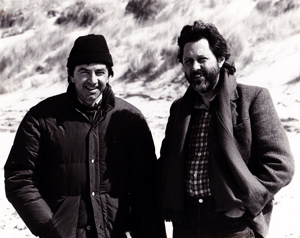
Director Bill Forsyth with producer David Puttnam on location for Local Hero
Forsyth provides films whose humour is original and has no parallel either on television or the cinema. He is writing and directing personal films whose humour is one his audience shares. The dilemmas and triumphs his film characters go through, are the very real ones most of his audience have also experienced.
Behind the screen Bill Forsyth is a private man. He lives in Glasgow and loves his city immensely, indeed all four of his films have been shot there or on the neighbouring Scottish coastline. Any slight on the culture of the Scots, he counters with the unusual statistic that more people in Scotland visit museums than go to football matches. Forsyth regrets however that similar enthusiasm cannot be generated among the cinema-going audience north of the border.
Actors and acting for film
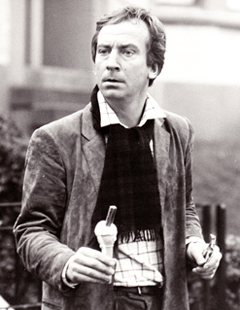
Bill Paterson played the lead role of DJ Alan Bird in the Bill Forsyth film Comfort and Joy
To tell the truth, I haven't found an awful lot of difference between the kids I was working with in That Sinking Feeling and Gregory's Girl and with the professionals that I have worked with since. I mean that in the nicest possible way vis-à-vis the professionals.
I have found with all the professional actors that I've worked with that they demand the same that the kids demand. If a kid is playing in a game or a young person is acting in a film, they'll do it in a real way as long as they are given something real to pin it on. It is the same with professional actors, they demand a setting, something tangible to work within, just like the play-acting we did as children.
The director's responsibility is to use his position of authority with actors sensibly. If you are in the process of directing and you actually have to stop the camera and stop the acting and shout out "Why didn't you say your line faster" then I think that you have failed with your actors because the understanding needed should have been taken care of earlier in your relationship. You really have not got the time nor the money to give new orders on the set.
Characters and their surroundings
If there is a theme in my films it would be that individuals are not in control of their surroundings and even if an individual initiates an action then he very shortly loses control of it. If a character doesn't end up regaining control then they soon realise it's probably a good thing that that is not possible. This is where the positive and optimistic outlook comes from. The characters find a kind of serenity, a serenity which comes from a realisation that what they wanted isn't possible and maybe doesn't matter anyway.
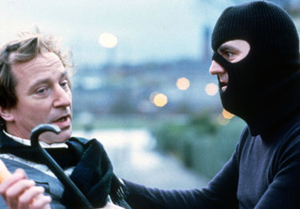
Bill Patterson in Comfort and Joy
The characters that people my films never triumph over circumstances, but they still find a serenity without that triumph. It may look like the traditional film cliché of a happy ending, that the hero has triumphed over the obstacles around him, but it isn't. All the hero has done is manage to accommodate his own situation more happily. This is cunningly disguised to look like triumph so that the studio people think that my stories have the accepted structure of a film!
'Baddies' in films
I think that I try to follow a sense of realism with this problem. I've got an idea - which I wouldn't necessarily pursue to its logical conclusion - that no one can be all bad. Everyone has got to have an excuse for being what they are and if not a good excuse then at least a good reason.
I find it interesting to present someone who maybe in the conventional sense of the story is a baddy - a negative person - and then let the audience see him for what he is. Like the oilman in Local Hero played by Burt Lancaster, the man who has ultimate wealth and power but still would rather be someone else. It's a kind of democratic principle that I set myself. It's too easy to classify somebody dramatically as good or bad because you are then using them as mere ciphers without letting them develop fully.
This refusal to simplify characters has also served me well as a comedic device. It's always handy to be able to take a convention and turn it on its head. That is probably the reason why I started searching for the opposites within characters. Now it's almost become a kind of habit because there is always an interesting side to someone apart from the obvious side.
It's not as if I see the world through rose tinted spectacles. I do have a very realistic view of the world but if I were to produce a really nasty character in one my films I would insist on giving them a sense of humour, a chance to crack jokes or give them the talent to be a really good dancer.
Politics in films

Clare Grogan and Bill Patterson in Comfort and Joy
I'm very self-conscious about using politics in film. I don't want to make films that are about something, I don't want to make a film that is about a man in a post-industrial urban society who is trying to find out who he is and what he is doing. I want to make films about what it is like to be him. I don't want to make films about situations but what it's like to be in situations and that's why I always avoid issues. I want to make films about what IT is like, rather than about IT.
Glasgow and London
I have to work in London for practical reasons like the editing of my films. I probably spend a third of the working year in London but I always feel the need to get away from there after two or three weeks. I don't like being that close to the film industry. If I'm in London too long I become bitchy and competitive when there's no real need to because I'm not competing with anyone in the British film industry at the moment. It came home to me recently when I found myself in a London bar quite heartily moaning about a film director that I hadn't met and whose work I had never seen. It was then that I realised that London was quite unhealthy for me.
I live in Glasgow at the moment because it's comfortable for me to be here and there's nowhere I've worked at that I'd prefer to be. Also in a certain sense I have a backlog of living and ideas that rest within this city. I did not start making feature films until I was 30 years old, so that means that there is 30 years worth of material waiting to be used in this city. That is the main reason why I remain here.
© Dominique Joyeux
Postscript: Comfort and Joy was billed alternatively as 'A War about Wafers' and 'A Serious Comedy'. It didn't enjoy the success of his earlier films and Bill followed David Puttnam to the States to try and crack that market soon after. Unfortunately that didn't come off for either of them but we do have a couple of gems that anyone would be proud of in Gregory's Girl and Local Hero.
See Mark Kermode's affectionate nine minute documentary taking the camera-shy Bill Forsyth back to the location of Local Hero. It's super!
Published in:

The Italian film magazine Cinema Cessenta published this interview in their Marzo-Aprile 1986 edition.
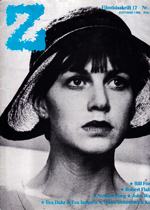
Norwegian magazine 'Z' (issue 4, 1985)
"We are a rather small magazine run entirely on idealistic grounds, and have no opportunity to pay any of our contributors. If you can accept this condition we would like to print your articles in the June issue...." Filmtidsskrift